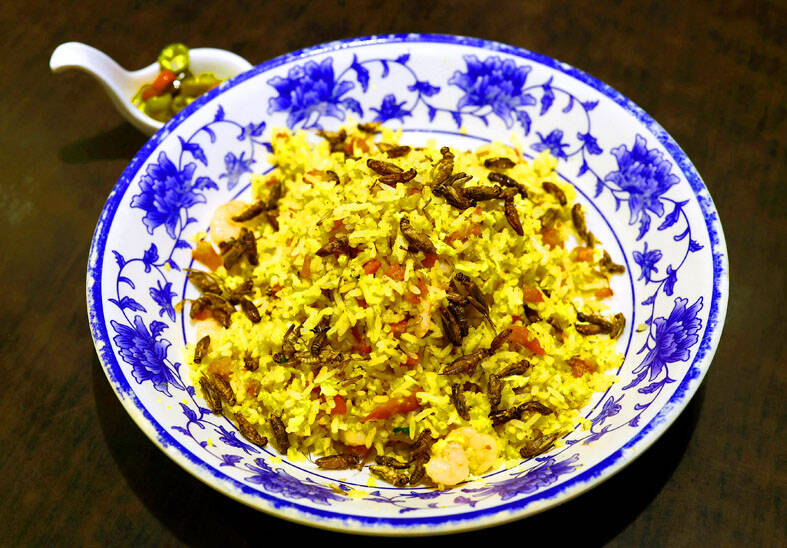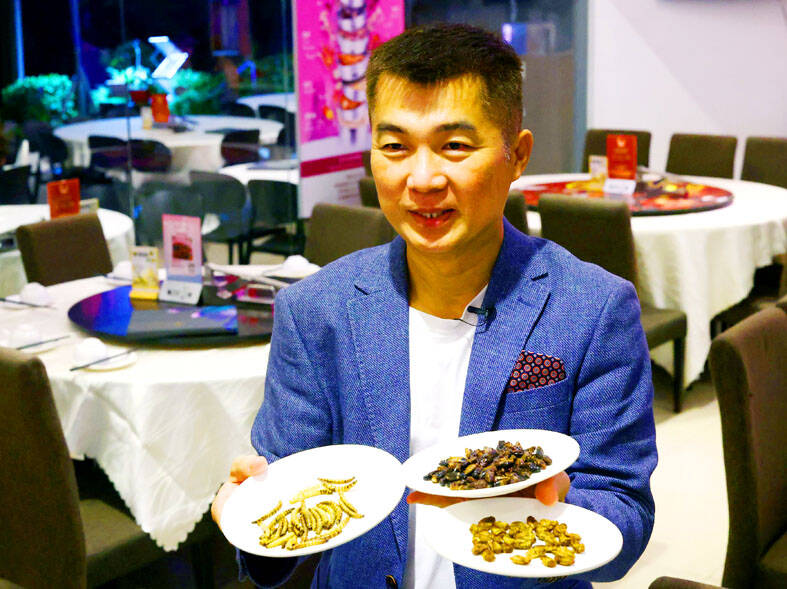At Singapore’s House of Seafood restaurant, the fish-head curry comes with a side of crunchy crickets, the tofu has bugs crawling out of it and the patrons cannot get enough.
The seaside restaurant is the first eatery to put insects on the menu after the Singapore Food Agency this month approved for human consumption 16 species ranging from crickets to grasshoppers, grubs and mealworms after two years of deliberation.
Crickets and other insects have long been enjoyed as street food in Southeast Asia, but not in the wealthy financial hub, where food imports come with strict restrictions for safety and hygiene purposes.

Photo: Reuters
Francis Ng, chief executive of House of Seafood, said customers love it when the dishes play up the insects, like that tofu dish he plated to look like bugs were crawling out of it, and a dish of glutinous rice balls studded with silkworms.
“It looks scarier so customers can film for their Tiktok,” said Ng, adding that his phone has been ringing off the hook with customers eager to book a tasting.
The restaurant has drafted a menu with 30 dishes that feature insects, which they can sell to the general public once their importers are approved by the food authority. For now, Ng is offering free samples.

Photo: Reuters
In 2019, Singapore said that it was aiming to produce 30 percent of its nutritional needs by 2030 instead of the current model where 90 percent of food is imports.
Insects could certainly help it move toward this goal, if people get over “the yuck factor,” said food security expert Paul Teng, an adjunct senior fellow at Nanyang Technological University’s S. Rajaratnam School of International Studies.
“Most insects are almost all protein,” Teng said, adding that there needs to be local production to make this alternative protein source affordable.
“Getting people to accept insects in their diet is a challenge, but really, it’s a normal food item. Let’s do something about it to prepare the consumer for it,” he said. “Me personally, I have no problem eating insects.”
The UN has deemed bugs a sustainable source of protein to feed a global population estimated to swell to 9.7 billion by 2050, and global food security issues due to extreme weather and conflicts have also increased interest in the high-quality, economical nutrition that bugs provide.
In Singapore, all insects approved for human consumption must be farmed in a controlled environment and not harvested from the wild, and they cannot be fed contaminants such as manure or rotten food, the food agency says.
In tandem, the UN’s Food and Agriculture Organisation has been promoting the farming of insects for human consumption and animal feed, and there has been local interest in importing insects, but cost remains a barrier for now.
Ng said that insects make up 10 percent of his costs at the House of Seafood, and they are all imported.
“The price is definitely higher than eggs,” he said.
It is too early to tell if insects are to become a feature of the Singapore diet or whether demand would fizzle out as it has for fake meat products.
For now, some diners say they are happy to develop a taste for bugs.
“If they have a higher source of protein, why not? I’ll add it to my daily meal and daily food intake,” said Bregria Sim, a 23-year-old a logistics executive, adding that she would pay about S$40 (US$30) for the novelty dishes.

Asian perspectives of the US have shifted from a country once perceived as a force of “moral legitimacy” to something akin to “a landlord seeking rent,” Singaporean Minister for Defence Ng Eng Hen (黃永宏) said on the sidelines of an international security meeting. Ng said in a round-table discussion at the Munich Security Conference in Germany that assumptions undertaken in the years after the end of World War II have fundamentally changed. One example is that from the time of former US president John F. Kennedy’s inaugural address more than 60 years ago, the image of the US was of a country

BLIND COST CUTTING: A DOGE push to lay off 2,000 energy department workers resulted in hundreds of staff at a nuclear security agency being fired — then ‘unfired’ US President Donald Trump’s administration has halted the firings of hundreds of federal employees who were tasked with working on the nation’s nuclear weapons programs, in an about-face that has left workers confused and experts cautioning that the Department of Government Efficiency’s (DOGE’s) blind cost cutting would put communities at risk. Three US officials who spoke to The Associated Press said up to 350 employees at the National Nuclear Security Administration (NNSA) were abruptly laid off late on Thursday, with some losing access to e-mail before they’d learned they were fired, only to try to enter their offices on Friday morning

STEADFAST DART: The six-week exercise, which involves about 10,000 troops from nine nations, focuses on rapid deployment scenarios and multidomain operations NATO is testing its ability to rapidly deploy across eastern Europe — without direct US assistance — as Washington shifts its approach toward European defense and the war in Ukraine. The six-week Steadfast Dart 2025 exercises across Bulgaria, Romania and Greece are taking place as Russia’s invasion of Ukraine approaches the three-year mark. They involve about 10,000 troops from nine nations and represent the largest NATO operation planned this year. The US absence from the exercises comes as European nations scramble to build greater military self-sufficiency over their concerns about the commitment of US President Donald Trump’s administration to common defense and

Cook Islands officials yesterday said they had discussed seabed minerals research with China as the small Pacific island mulls deep-sea mining of its waters. The self-governing country of 17,000 people — a former colony of close partner New Zealand — has licensed three companies to explore the seabed for nodules rich in metals such as nickel and cobalt, which are used in electric vehicle (EV) batteries. Despite issuing the five-year exploration licenses in 2022, the Cook Islands government said it would not decide whether to harvest the potato-sized nodules until it has assessed environmental and other impacts. Cook Islands Prime Minister Mark Brown